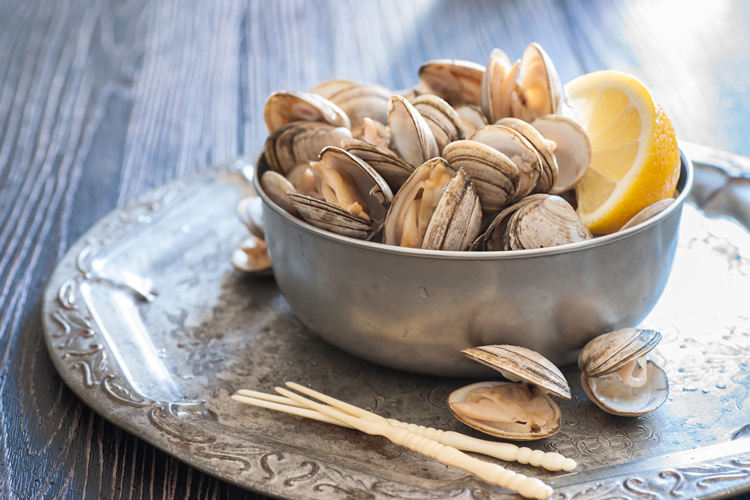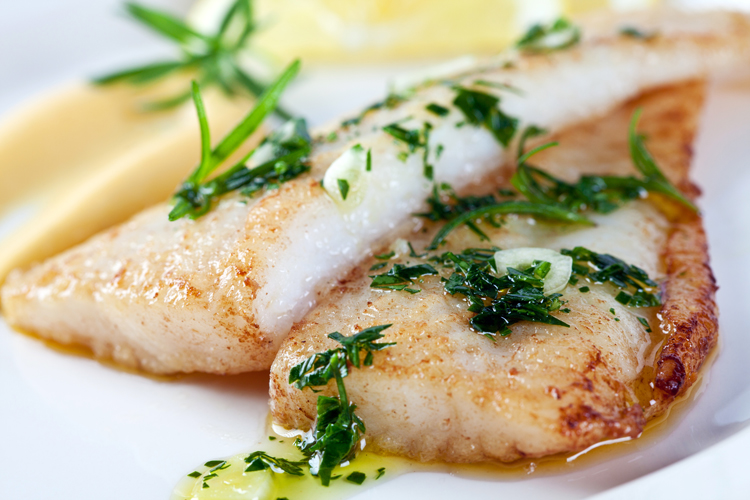
Baby-Building Nutrients in Seafood
Fish and seafood are excellent sources of protein, and rich in the antioxidant selenium and a healthy fat called omega-3. During pregnancy, omega-3 fats are important for your baby’s brain and eye development and are also good for your own heart health. Because your baby gets all their nutrition from you while you’re pregnant and breastfeeding, they’re counting on you to get omega-3s into your diet.
Iron: Shellfish, like shrimp and mussels, are especially high in iron, which along with zinc, can help prevent preterm birth and preeclampsia (a serious blood pressure condition during pregnancy). Having enough iron also prevents iron deficiency anemia which can lead to severe learning problems.
Zinc: Having enough zinc in your diet helps prevent neural tube defects, or birth defects of the brain and spine. Zinc is also needed for your baby’s developing immune system.
Iodine: Iodine is important for thyroid and brain development. Many prenatal vitamins don’t contain iodine.
Choline: Your baby needs choline for brain development and to help prevent neural tube defects. Choline is not found in all prenatal vitamins. Salmon provides a good source of choline, and eggs are also an excellent source.
Omega-3 fats are found in much smaller amounts in other foods like grass-fed beef. Chia seeds, flax seeds, walnuts, and canola oil are also rich in omega-3s. However, the type of omega-3s found in plant foods are not used by the body in the same way. So even though they are healthy fats, it’s good to get the kinds of omega-3s found in seafood too.
Some milk, cereal, soy milk, margarine, and eggs are fortified with omega-3s. Some prenatal supplements have omega-3s added too; you might see them on the label as DHA and EPA.
Some people avoid seafood because they worry about too much mercury. The amount of mercury found in seafood depends on the fish’s diet, habitat, age and size. Larger, predatory fish that eat smaller fish have more mercury in their body. For example, swordfish, which is not recommended during pregnancy, is high in mercury, but salmon is very low.

The US Dietary Guidelines for Americans recommends pregnant women eat 8-12 oz of seafood that’s lower in mercury each week. This equals 2-3 servings that are about the size of the palm of your hand.
These fish are low in contaminants but don’t have as much omega-3:




Fishing for your own seafood is fun and it’s great if you have friends or family that provide you with fresh-caught fish! But local lakes and rivers can be polluted with chemicals too, so watch out for advisories posted at each body of water. There are specific guidelines posted for pregnant women and children about how much of each fish is safe to eat in a week. For fish from waters that don’t have any posted guidance, eat only one serving a week and don’t eat any other fish. For locally caught fish, remove the skin, fat, and internal organs before cooking.
These fish have excessive mercury or other environmental chemicals found in some waters. They are not safe for pregnant and breastfeeding women to eat.
Canned tuna is tasty, relatively cheap and easy to prepare. In general, canned light and skipjack tuna are low in mercury. The FDA says it’s ok for pregnant women to eat 8-12 oz of canned light tuna per week, which is 2-3 servings. Choose tuna packed in water. Albacore is much higher in mercury and should be limited to 4 oz. a week. When in doubt, talk with WIC or your healthcare provider.
NIH. Front Cell Neurosci. 2019; 13: 62.
https://www.ncbi.nlm.nih.gov/pmc/articles/PMC6414196/#:~:text=Prenatal%20zinc%20deficiency%20resulting%20from,subtle%20neurological%20and%20cognitive%20impairments.
NIH. PubMed. Iodine status and supplementation before, during, and after pregnancy.
https://pubmed.ncbi.nlm.nih.gov/32792134/
NIH. Iodine Contents in Prenatal Vitamins in the United States. 2017 Aug 1; 27(8): 1101–1102.
https://www.ncbi.nlm.nih.gov/pmc/articles/PMC5912719/
NIH. Nutrients. Choline: Exploring the Growing Science on Its Benefits for Moms and Babies
2019 Aug; 11(8): 1823.
https://www.ncbi.nlm.nih.gov/pmc/articles/PMC6722688/
FDA. Fish advice for pregnancy.
https://www.fda.gov/food/consumers/advice-about-eating-fish
Fish4Health. Find the Best Fish for You.
https://fish4health.net/eating-fish/find-the-best-fish-for-you/
Science Direct. Persistent and toxic chemical pollutants in fish consumed by Asians in Chicago, United States.
https://www.sciencedirect.com/science/article/abs/pii/S0048969721072909
Consumer Reports. How Worried Should You be about Mercury in Your Tuna?
February 9, 2023.
https://www.consumerreports.org/health/food-safety/how-worried-should-you-be-about-mercury-in-your-tuna-a5041903086/
Author:
Bridget Swinney MS, RDN, LD